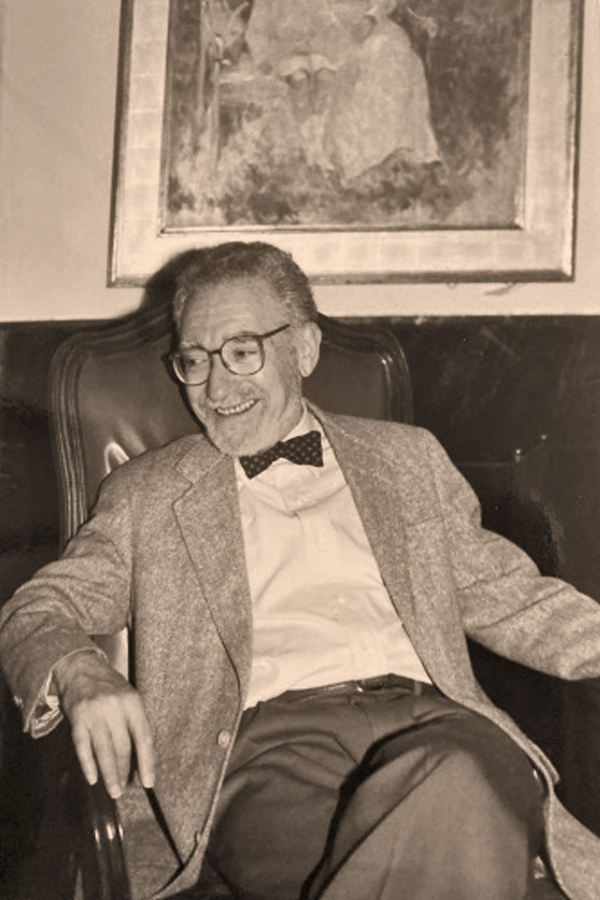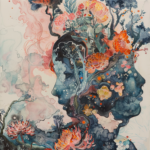
CIPS NewsBriefs - Spring 2022
In Memoriam
Sheldon “Shelly” Bach, PhD, FIPA
Remberance offered by Martin L. Nass, PhD, FIPA
Sheldon (Shelly) Bach was a most unique individual. He was super-intelligent, warm and personable, wrote extremely well, and was a gifted psychoanalyst, teacher and supervisor. I first met Shelly in 1961. We were both members of the NYU Postdoctoral first class. We, and 12 others were selected to join as students in the first university program in the country in psychoanalysis for psychologists.
Shelly and I hit it off immediately. We were both World War II combat veterans, he in the army in Europe and me in the navy in the Pacific. I was drawn to him by his astute (and wryly humorous) comments in classes and his already vast knowledge of psychoanalysis. One year following my graduation from the Postdoc Program, Shelly, Mark Grunes, Irv Steingart and I formed a study group. We invited Bert Freedman to join us the following year. We met monthly for roughly 30 years. When I left because of medical necessity, Steve Ellman joined the group.
The group was a personal and professional highlight for all of us. We presented and discussed our writings, had ongoing clinical discussions and coupled the meetings with good food and wines. Shelly was our resident gourmet and meetings at his house were especially outstanding.
I have always been so impressed with Shelly’s productivity and his ability to write in a conversational manner. Reading his work always seems to me to be like hearing him speak. He had the ability to explain the most complex material in the simplest language and his work on narcissism has been pioneering. He has achieved the recognition that he deserves from all major psychoanalytic organizations.
I will miss Shelly and send my love and condolences to his family and to all who knew and loved him.
Remberance offered by Steve Ellman, PhD, FIPA
I wrote the first paragraphs a few years ago in a preface to a book of Shelly Bach. I think it does give a feeling for Shelly Bach’s wonderful contributions.
One who has not yet read Shelly’s papers is in for a rare treat; they will discover new worlds revealed within what were previously thought to be familiar places. I believe those who have already read some of his work, will have an experience of rediscovering precious clinical and theoretical gems that have influenced them and many other therapists and analysts. In fact, his influence has quietly spread throughout the field, often without an author fully acknowledging or perhaps realizing Shelly’s impact on their concepts and clinical stance. I am sure that readers of his work will share my excitement in reading any of his current papers.
I have read Shelly’s papers for many years, and I have always been impressed by the originality of his concepts. Thus, the papers on the chimera, the digital self or his ideas about two ways of being, are but a fraction of some of his pioneering thoughts describing the human condition. For some, it might be important to connect his concepts to other major analysts such as Freud, Kohut, Winnicott or others. Normally, this type of discussion, to see theoretical positions touching and mutually influencing each other would interest me. However, in reading his papers I am searching for a different perspective to clarify my emotional as well as my intellectual reaction to his work. I am reminded of Oliver Sacks’ Awakenings (1973) where patients who developed encephalitis came alive psychologically with dosages of l-dopa. In a manner parallel to Awakenings, it struck me that each time I heard or read about Shelly’s patients a new aspect of human existence would come alive for me. His vivid descriptions of patients would always leave me with new ways of thinking about various topics and experiences. This feeling of awakening reinforced my sense that, much of psychoanalytic thought and clinical work has been vivified through his clinical concepts and descriptions. He has also implicitly, and at times explicitly, shown how theories touch and can be integrated in new and valuable ways.
I wanted to recount my reactions to Shelly’s work because in so many ways Shelly’s presence has enlivened my life and my family’s life. Both of my children deeply love Shelly, and I was surprised and then thought why am I surprised, at how much Peter and Lauren are affected by Shelly’s death. Here I must take an aside and say until the very last years of his life Shelly in many ways got better with age. Peter reminded me that during his late 70’s Shelly began to play tennis and all of us were amazed that in a short while he could really play. Peter would frequently play with him, and I remember him talking about the balls Shelly could reach and hit back. Although Shelly never hinted that he was athletic, he clearly was a good athlete and he not only seemed to enjoy playing but it was rare that any of us had as much fun playing tennis as when we played with Shelly and Phyllis, Shelly’s wife. Unfortunately, she hit harder and was more competitive.
When Shelly was 80, we asked him what was something that he had always wanted to experience, and he told us that he had never drank a bottle of Petrus. It was undoubtedly the best gift we have ever given– for Shelly in a characteristic way came over to our house and celebrated his birthday with us by sharing the bottle with us. I decided at that point that whenever there was a wine, I wanted to try I would buy it for Shelly’s birthday! What actually happened is that we formed a 22-year wine club where each year we would purchase special wines amidst special dinners that were planned. Characteristically Shelly awakened our palates and quietly educated us in various aspects of French wines. He did this in the least pretentious way that a wine lover could describe the joys of the vine.
But of course, I am dwelling on the trivial for it is too painful to remember the love and caring that he brought to us—Besides being a mentor to both Carolyn and me he was always there at times when you needed a friend or a listener to let you express anything from the least to the deepest conflict that you were facing. He showed us outside of a clinical setting what it meant to be lovingly present in another’s mind. He frequently awakened in me solutions to issues that I thought could not be resolved. I wonder what I might have been like without him (I shudder at the thought).
I will end this remembrance by saying that as he grew older, he literally became a man for all seasons. When we were younger, he rarely commented on political issues in institute life. Without dredging up old conflicts I witnessed that as he grew older when there was an important principle Shelly was more than willing to stand up for various causes. He was particularly present when some members were unfairly picked on or discriminated against. He did this despite the fact that it brought him no personal gain, in fact it brought him personal difficulties. In a quiet way more and more he stood up in ways that helped institutes become more decent, more honorable groups. It amazed me how a non-political member could improve so many aspects of a group’s functioning. Shelly helped all those around him whether as an analyst, teacher or as a legendary supervisor. We should work hard to keep his spirit alive, it is a wonderful giving and caring spirit that he has tried to bring alive in all of us.
Remberance offered by Aaron Thaler, PhD, FIPA
“Remembering Sheldon Bach”
It was my huge good fortune to have Shelly as a supervisor beginning early in my training and continuing as a teacher and a friend for thirty years. I really don’t know how I would have developed as an analyst or what my work would be like without this time together. Shelly was uniquely attuned to the problems and vulnerabilities of very ill people. He had such a deeply human understanding of these difficulties and how to provide help. As I was getting to know him, I used to ask how he had found his way into understanding the core of people’s struggles with early developmental disruptions and distortions. Like he did in his writing, he related a lot of examples of the ways he had learned from patients, but what also came through in being with Shelly was the way he listened and took everything in with such direct, sustained attention, caring, and empathy. I remember when I first experienced this early on in telling him about some troubling sessions that had me shaken and worried. Shelly didn’t try to do anything with the material. He just knew exactly where I was, and responded in a way that conveyed surprising calm and rock-solid faith in the treatment. He had a musical voice that could sometimes be high and lilting and gently soothing, and at other times could be deeper and very definitive. Here he communicated an unshakeable sense of process and acceptance of what was happening. I experienced a big shift from anxiety to calm and trust, and the sense of an expanding perspective on how analysis works. And I recognized right away this was an experience of real “holding,” of being seen and understood, affirmed and reassured, which Shelly provided again and again throughout our work. He had shown me that what seemed scary and problematic was a natural part of the treatment that needed to be reached. Along with being so present and attuned, Shelly was incredibly supportive and encouraging and generous. All of this added up to the experience of being held in a way that gave me the confidence and freedom I needed to be myself in my work and follow my own process of discovery. Anderson1, in a paper about how Winnicott worked, based on interviews with some of his patients, included a statement from one patient, Mr B, who said that “in his [own] professional work, he observed no less than 10,000 mothers, and yet ‘Winnicott was the best mother I ever met.’” I think the same is true of Shelly. He was like Winnicott among us, a good enough “holding” mother who gave so much and allowed me and so many of us to work and grow. I think of him and I miss him.
1. Anderson, J. W. (2014). How D. W. Winnicott conducted psychoanalysis.






